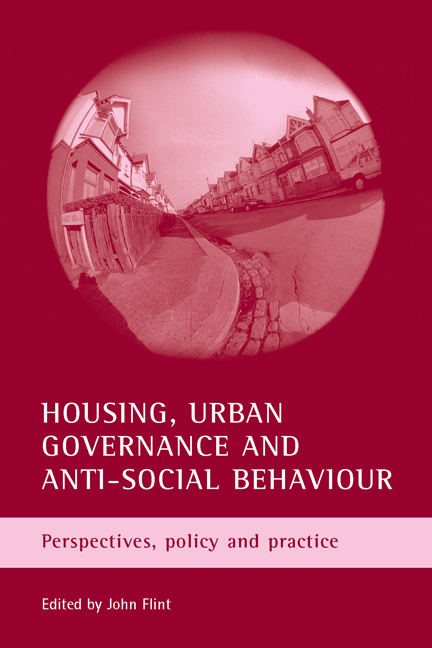Book contents
- Frontmatter
- Contents
- List of tables, figures and photographs
- Acknowledgements
- Notes on contributors
- Introduction
- Part 1 The definition and construction of anti-social behaviour in the UK
- Part 2 Legal techniques and measures utilised by social landlords to address anti-social behaviour
- Part 3 The emerging mechanisms of addressing anti-social behaviour in housing governance
- Part 4 Studies of housing and anti-social behaviour from an international perspective
- Index
thirteen - Housing and anti-social behaviour in Australia
Published online by Cambridge University Press: 15 January 2022
- Frontmatter
- Contents
- List of tables, figures and photographs
- Acknowledgements
- Notes on contributors
- Introduction
- Part 1 The definition and construction of anti-social behaviour in the UK
- Part 2 Legal techniques and measures utilised by social landlords to address anti-social behaviour
- Part 3 The emerging mechanisms of addressing anti-social behaviour in housing governance
- Part 4 Studies of housing and anti-social behaviour from an international perspective
- Index
Summary
Introduction
Since the 1980s social housing in Australia has, as in the UK, increasingly become the tenure for individuals with limited incomes and high levels of social need. Further, the growing residualisation of social housing has meant that the poorest sections of the community are concentrated into smaller geographical localities. As several of the chapters on Britain in this volume describe, contemporary social housing estates accommodate disproportionately large numbers of households suffering from mental illness and exhibiting characteristics associated with poverty and stress. The intensive needs of many tenants result in a new set of challenges for housing managers in terms of supporting sustainable tenancies. This chapter explores the theoretical and policy implications of one of these challenges, that of addressing anti-social behaviour (ASB) on social housing estates. The chapter’s aims are threefold: firstly, to provide an overview of the different perceptions of ASB and the emergence of new discourses linked to housing in Australia; secondly, to offer a comparative discussion on Australian and UK approaches, drawing on a recent research project examining key issues and questions facing policy makers and housing organisations in the Australian context; and thirdly, the chapter explores the implications of the current findings for future research on housing and ASB.
Policy context
In Australia funding for social housing is provided under the Commonwealth State Housing Agreement (CSHA), an agreement made between the federal government and state and territory governments. Under the terms of the Agreement, the federal government pursues national objectives to support individuals and communities while state and territory governments are responsible for implementing and administering the delivery of social housing. Overall, Australian governments have provided greater support for home ownership, resulting in a small social rental tenure in comparison with the UK and Europe. At the present time in Australia, 66.2% of households are homeowners/purchasers, 21.8% are private renters, 4.5% are public renters, 2.8% are in other tenures and 0.4% reside in community housing (Productivity Commission, 2004, p 16.4).
Recent evidence from within Australia (Judd et al, 2002; Shield, 2002; Jacobs and Arthurson, 2003, 2004) has highlighted the extent to which ASB has become a significant concern of residents living in social housing, and the correlated expectation that housing agencies will respond to these concerns.
- Type
- Chapter
- Information
- Housing, Urban Governance and Anti-Social BehaviourPerspectives, Policy and Practice, pp. 259 - 280Publisher: Bristol University PressPrint publication year: 2006
- 1
- Cited by



